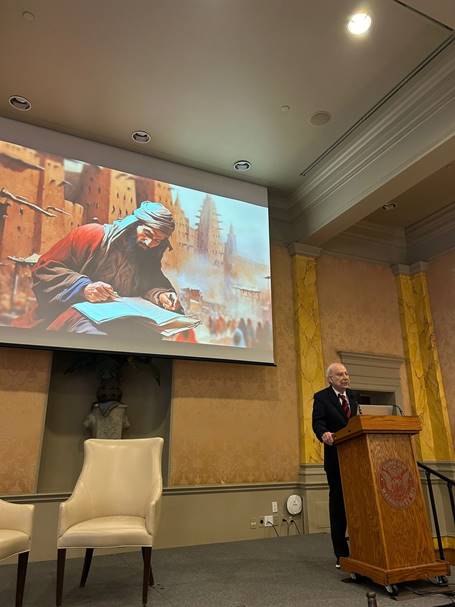

The eloquence and passion with which Ambassador Akbar Ahmed spoke left an indelible impression, ensuring that those fortunate to participate in this extraordinary event departed with not only a broadened perspective of history but also a renewed understanding of the power ofdialogue and the importance of fostering a more harmonious world
An Enlightening Lunchtime Journey: Ambassador Akbar Ahmed Explores the Epic Travels of Ibn Battuta
By C. Naseer Ahmad

Ambassador Akbar Ahmed, a renowned scholar and diplomat, is celebrated for his profound knowledge and singular contributions to the disciplines of Islamic Studies and global affairs. He holds the prestigious Ibn Khaldun Chair of Islamic Studies at American University, where he plays a pivotal role in advancing academic research and discourse. Beyond his substantial academic contributions, Ambassador Ahmed is also recognized as a Global Fellow at the Wilson Center, an esteemed institution that excels in promoting meaningful dialogue and collaboration on critical global issues that affect societies worldwide.
In a remarkable display of his captivating expertise and eloquent communication, Ambassador Ahmed delivered an enlightening lecture centered around the life and extensive journeys of Ibn Battuta, an iconic explorer from the 14th century. Ibn Battuta's adventures were extraordinary, as they encompassed over 70,000 miles across numerous diverse regions and cultures—outdistancing the journeys of contemporaries such as Zheng He and Marco Polo. Ambassador Ahmed's lecture was part of a luncheon event hosted by the Medieval Interest Group, a respected association that gathers within an exclusive private club positioned in the lively heart of Washington, DC.
This distinguished club prides itself on an illustrious history and a membership roster that reads like a who's who of accomplished figures, featuring leaders in fields spanning the arts, literature, science, medicine, and public service. The prestigious nature of the club is further underscored by its past members, which include three former US presidents, esteemed justices of the Supreme Court, and recipients of the Nobel Prize, Pulitzer Prize, and Presidential Medal of Honor.
Incidentally, both Ambassador Akbar Ahmed and this writer are members of this private club in Washington DC.
The atmosphere was charged with anticipation as attendees settled in for the event. Before Ambassador Ahmed began his formal address, they were treated to a documentary film that enriched their understanding of Ibn Battuta's life and the expansive travels he undertook over three transformative decades. The film shed light on Battuta's familial roots and chronicled his extensive explorations, notably highlighting his ventures through the culturally rich Indian Subcontinent.
Ambassador Ahmed's formal lecture was met with rapt attention, as he artfully painted a vivid picture of Ibn Battuta's pioneering exploits, emphasizing the sheer scope and daring of his travels, and the diverse cultures and societies he encountered along the way. His presentation not only highlighted Ibn Battuta's extraordinary achievements but also set the stage for a deeper appreciation of historical exploration and cultural exchange.
The lecture concluded with an engaging and thought-provoking Q&A session, where Ambassador Ahmed adeptly addressed a wide range of insightful questions posed by an inquisitive audience. He used this opportunity to articulate his personal dedication to promoting interfaith dialogue—an essential mission aimed at building bridges between various religious communities to encourage mutual understanding and peace. Furthermore, Ambassador Ahmed offered his perspective on the ongoing conflicts in the Middle East, discussing their complexities with a clarity and conviction that resonated deeply with those present.
The eloquence and passion with which he spoke left an indelible impression, ensuring that those fortunate to participate in this extraordinary event departed with not only a broadened perspective of history but also a renewed understanding of the power of dialogue and the importance of fostering a more harmonious world.

